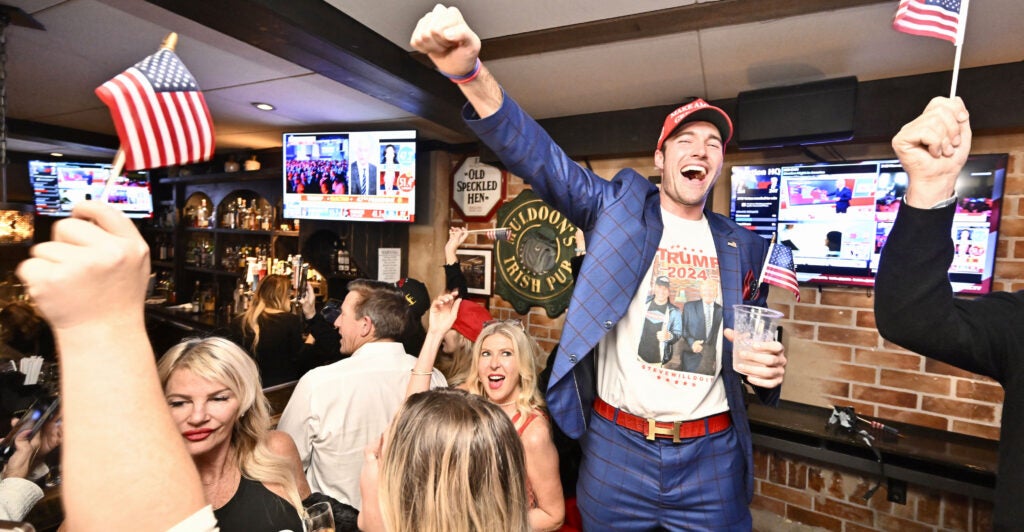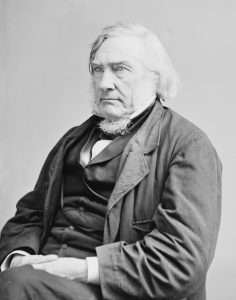
Few broadcast journalists can facilitate a conversation with the apprehension and excellence of Tavis Smiley. The former PBS host now owns KBLA, an “unapologetically progressive” Los Angeles radio station, where he hosts his own program, syndicated in New York, Chicago, and many other cities.
Bringing an analytic scalpel and unabashed curiosity to interviews, he covers the most consequential issues of politics, pop culture, and sociology. It is not a gotcha forum, but neither is it fawning.
He is also the editor of The Covenant with Black America: 20 Years Later, an anniversary edition. Smiley has gathered an assembly of intellectuals to explore racial disparities in health care, housing, environmental justice, and other subjects featured in separate chapters throughout the book. Among the contributors are Reverend William Barber, Maya Harris, the vice president’s sister, and Marian Wright Edelman.
A bracing and salient analysis of problems related to “the color line” doubles as a policy manifesto, offering socioeconomic and governmental recommendations that begin with individual behavioral choices and graduate to the federal government. We spoke about the book, the election, and other topics. This conversation has been edited for length and clarity.
DM: One of the contradictory aspects of American life is that more Black Americans are in leadership positions than ever before. We’re focused on a Black woman running for president. And yet, as you lay out in The Covenant and as the experts you’ve assembled in the book layout, Black Americans still suffer from tremendous disparities. How do we navigate this contradiction?
TS: It’s a great question. For starters, there is an interesting dichotomy within the Black community. We have, historically, been quite good at achieving individual success, but it is the collective where we lag. That’s the rub. It is troubling when those outside the Black community point to certain individuals—Barack Obama, now Kamala Harris—to explain away collective disparities. The bottom line is that Black folks still lag in every single leading economic indicator.
DM: The book’s indisputable facts verify the thesis you just articulated. Why is it that so much of the public has an aversion to facts?
TS: Apparently, there aren’t any objective facts anymore. I just bumped into Kellyanne Conway at the Democratic National Convention. The first thing I thought of was her phrase “alternative facts.” So, here she is as a pundit at the DNC, when she worked for an administration that promulgated countless lies, or in her words, “alternative facts.” We live in a world where people can determine what their truth is. As the famous saying goes, “The first casualty of war is truth.”
One could argue that the Civil War, at least culturally and politically, never stopped. The truth is a casualty every day, and it is not only the fault of Donald Trump but it is the complicity of the mainstream media. They insist on both sides-ism’s phony objectivity and aren’t really interested in the facts. They mainly cover the horse race, and they neglect the issues. So, if they aren’t going to cover the issues, they certainly aren’t covering the facts.
DM: You speak about the threat to democracy. How much has America’s failure to deal with the W.E.B. DuBois famously called “the color line” brought us to this?
TS: In 2008, so many people thought that Obama’s election would usher us into a post-racial America. It was laughable then, and it is even more laughable now. My view is that racism is still the most intractable issue in this country. There are so many issues that one can put on the list of intractability—climate change and poverty. It seems America no longer has the will, even if we have the skill to do the hard things. Wrestling with climate change is hard. Wrestling with poverty and economic immobility is hard. Wrestling with the history and persistence of racism in this country is incredibly hard.
There are so many tentacles that offshoot racism that leads to economic gaps, educational achievement gaps, and housing gaps, and all of these gaps keep America divided, older, but not wiser. We still have a fundamental aversion to addressing one of our original sins.
DM: We often address racism superficially. Christopher Lasch argued that America has resigned itself to not solving its significant problems, so it fights over small issues as a compensatory measure. The Covenant with Black America is refreshing because it tackles the big issues in crystal clear language. So, what do you make of another contradiction? Except for the Republican Party, our society has become sensitive to racist language and jokes. The Academy Awards won’t nominate films if they don’t meet diversity requirements. And yet, we’re neglecting to focus on these significant issues that are much more impactful on people’s lives than the Academy Awards or discussions about “cancel culture.”
TS: I couldn’t agree with you more. I’ll put it this way: We’re playing around the edges. We don’t want to do the heavy lifting of addressing all these divides. We don’t want to deal with the elephant in the room, which is public policy. A new report from the Joint Center for Political and Economic Studies is titled “The Best Black Economy in Generations—And Why It Isn’t Enough.” I had one of the authors on my program, and he concluded that for Blacks to catch up with whites economically, there has to be a “targeted” approach.
Here’s the problem: whenever there is a Black face in a high place, and you press these elected officials about the disparities in housing, health, homelessness, economic mobility, and education achievement, you get the answer, “I’m not the president of Black America. I’m the president of all America.”
Few people want to have the equity conversation. There is even a lie about what equity means. Equity means that the people who hurt the most need the most attention. We’ll scarcely have the equality conversation. So, we aren’t going to have the equity conversation.
On top of that, we have these Republicans who are suing any program anywhere that is targeting Black people. If it targets Black people—there is that “target” word—they are bringing every legal and political force against it.
So, now we have the leading Black think tank, the Joint Center, calling for targeted public policy to address the damage of gaps and disparities. If we still only want to play around the edges rather than focus on an underclass of people who are perennially held back, what gives?
It is not going to get done when even Black leaders say, in essence, “We can’t do the Black thing. We have to do the America thing.”
DM: To that point, it should be sufficient to do the “Black thing” on its terms, but on environmental justice, public education, and housing, there isn’t one that, if tackled from the local to the federal level, wouldn’t help everybody. Why do we act as if Black Americans live in a separate country?
TS: I hate to utter this, but the more chronologically gifted I become, the more I conclude that certain people in this country have such a deep animosity for some Americans that they would rather see them held back than adopt good public policy and scale-up successful programs.
Ronald Reagan suggested that a rising tide lifts all boats. That’s bad policy because a rising tide doesn’t lift all boats. If you’re in a dingy and the tide rises too fast, you’re going under. However, to take Reagan’s thesis, there are ways that we can elevate all Americans.
Do you recall all those Republican governors who turned down the money to expand Medicaid because it was part of the Affordable Care Act, or “Obamacare”? That money did not say, “Black money.” It did not say, “Give this money to Negros.” But these Republican governors turned down the money even knowing that countless white people suffer from all kinds of maladies. They rejected the funds because it was going to aid Democrats politically, politically aid Barack Obama, and I also think, aid black and brown folks with pre-existing conditions.
So, instead of succeeding together, we have a sick situation in which we accept that none of us will fully succeed because others have to suffer.
DM: Why did you feel it was important to include solutions to the problems that begin with the private citizen and extend to the federal government in the book?
TS: The short answer is that the cavalry is not coming. We must begin with saving and helping ourselves. Two words are key to this conversation: agency and accountability. I’m all for holding everyone accountable. No one wants to be in a personal or professional relationship where the other party is not accountable. However, we can’t hold others accountable if we don’t use our agency. One of my favorite Jesse Jackson lines is, “We lose too many elections by the simple margin of our absence at the polls.” All of our best leaders, no matter how hard they pressed to hold government accountable, never shied away from holding the people accountable. So, it was vital to tell the reader, “This is what you can do, and if you do these things, starting with yourself, it makes it easier for us, as the collective, to hold government accountable.”
DM: If Shelby Steele were sitting next to me, he would say that racial disparities are a matter of individual initiative—children born out of wedlock and the problems within a communal culture. Therefore, Tavis Smiley, you won’t get anywhere if you and all the academics and activists you’ve assembled for The Covenant with Black America don’t address those issues.
TS: I’ve debated with Shelby over the years, and I always say to him, “You’re right, but here’s where you are wrong. It’s not either/or. It’s both/and.” So many of the issues that he raises, he’s right about. There are far too many babies born out of wedlock. But no one in this book is skirting those issues. We are challenging everyday Black folk to exert their agency, expand the inventory of their ideas, and see the world through a different prism while looking in the mirror. We must assign ourselves the work that needs to be done. The notion of personal responsibility is in this book from page one to the last page.
We can still do both, though. We can hold ourselves accountable and engage in acts of personal responsibility, as most Black people do, all day. But what does that mean if there are still systems and structures in place that leave us at a disadvantage?
DM: And there are problems too enormous for even the most responsible, talented, and disciplined people to solve on their own. For example, there is an excellent chapter in the book on environmental justice by Mustafa Santiago Ali, who is the executive vice president of conservation and justice for the National Wildlife Foundation. What does a Black family with exemplary character do about environmental justice?
TS: Exactly. To extend your brilliant point, environmental justice and the climate crisis are the issues of the “fierce urgency of now,” to quote Dr. King from another context. Those issues of the environment are so massive that no one person alone, or one community alone, can make a dent even if they are doing all the right things—reducing, recycling, and driving electric cars. We don’t own oil refineries. Introducing race it becomes even more acute.
The people who are the disproportionate victims of environmental injustice and climate catastrophe are Black. So, not only can we not fix that problem by ourselves, but we’re the ones being most victimized by the climate catastrophe, which is a result of the failures of public policy to create a clean environment and sufficiently prevent and punish the polluters.
DM: You said that you don’t own an oil refinery but a radio station—KBLA in Los Angeles. You often criticize “corporate media.” Why?
TS: It’s a great question, but I want to extend it well beyond me because so many are doing righteous work. I believe that the Black and independent media are more relevant and necessary now than ever because some topics don’t get discussed if we don’t put them on the docket. Too many Americans catching hell are rendered invisible if we don’t tell the truth. Too many Americans do great work and do it successfully, but they are never in the spotlight if we don’t spotlight them.
Only a handful of companies own most of the media people read and watch. I’m becoming increasingly concerned about the monopolized America we live in. This company buys that company. There is a leveraged buyout over there. Local newspapers shut down. All of this leads to a constriction of our choices and voices.
As we say in the Black church, “Somebody’s got to hold up the blood-stained banner.” I’m far from the only one, and I don’t have a monopoly on the truth, but as long as I have breath in my body, I will try to hold up the blood-stained banner.
The post Tavis Smiley Is “Increasingly Concerned About the Monopolized America We Live In” appeared first on Washington Monthly.


 3 months ago
8
3 months ago
8 









 Bengali (Bangladesh) ·
Bengali (Bangladesh) ·  English (United States) ·
English (United States) ·